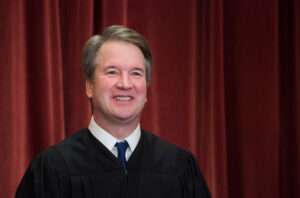The Volokh Conspiracy
Mostly law professors | Sometimes contrarian | Often libertarian | Always independent
Kavanaugh Indicates States Can't Bar Residents From Getting Abortions in Other States
This makes it likely, though not certain, that the Supreme Court will strike down such laws if states enact them.

Today's Supreme Court decision in Dobbs v. Jackson Women's Health Organization reversing Roe v. Wade raises a variety of important new issues of law and policy. One of them is whether states can bar residents from traveling out-of-state to get abortions. In his concurring opinion in Dobbs, Justice Brett Kavanaugh writes that this is question is "not especially difficult," and suggests the answer is "no":
[S]ome of the other abortion-related legal questions raised by today's decision are not especially difficult as a constitutional matter. For example, may a State bar a resident of that State from traveling to another State to obtain an abortion? In my view, the answer is no based on the constitutional right to interstate travel.
You might question the propriety of Kavanaugh opining on this issue that wasn't before the Court. But opine he did. And his doing so sends a strong signal that the Court is likely to strike down state laws banning interstate travel for purposes of getting an abortion. Kavanaugh appears to be the key swing voter among the five justices who voted to overrule Roe. It is highly likely that the three liberal dissenters would also vote to strike down such laws. The same could well be true of Chief Justice John Roberts (who wrote a concurring opinion that would have preserved Roe with respect to the vast majority of abortions). That would ensure the necessary five votes to strike down state bans on travel to get an abortion.
In a previous post on this issue, I pointed out that there are actually three compelling rationales for striking down state laws banning interstate travel for purposes of getting an abortion. In addition to the right-to-travel issue raised by Kavanaugh, there are also the Dormant Commerce Clause and procedural due process limits on states' extraterritorial jurisdiction. One or more of the other justices in the Dobbs majority might well endorse at least one of these theories. This is especially likely because upholding such laws would open the door to a variety of other state restrictions on interstate movement. If states can ban travel to get an abortion, why not travel to engage in any other activity a state government doesn't approve of?
While state abortion travel bans are likely to get struck down, the same is not necessarily true for a potential federal law banning such activity. Many of the arguments that apply against state laws do not apply to the federal government, most notably the Dormant Commerce Clause theory. Interestingly, however, the right-to-travel argument embraced by Kavanaugh is one that probably does constrain the feds, as well as the states.
The issue of abortion travel bans is distinct from the question of whether the federal government has the power to ban some or all abortions outright, regardless of whether they involve interstate travel or nor. There is an argument that such a law would exceed the scope of Congress's enumerated powers under the Constitution, even if there is no constitutional right to abortion. As far as I can tell, neither Kavanaugh nor any other justice addressed that question today. In my view, current Supreme Court precedent probably does allow Congress to ban all or most abortions, but that precedent is flawed and might potentially be cut back by the Court. Similar structural issues are raised by proposals (advanced by liberal Democrats) for a federal law overriding state abortion restrictions.
Of course, there are also significant political obstacles to passing any nationwide federal abortion law. Whether either side can overcome them remains to be seen.
UPDATE: It's worth noting that Kavanaugh also indicates it would be unconstitutional for a state to "retroactively impose liability or punishment for an abortion that occurred before today's decision takes effect."
UPDATE #2: For those interested, I wrote a previous post addressing the question of whether people will "vote with their feet" for abortion in a post-Roe world.


Show Comments (49)